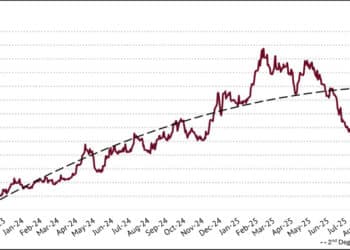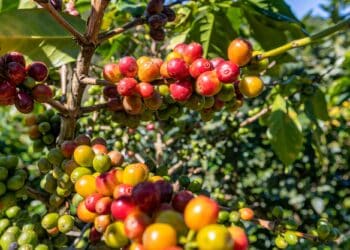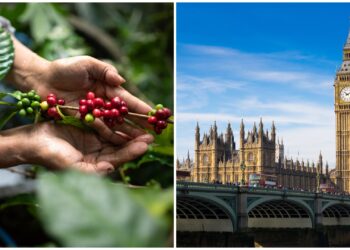When Canadian Pierre Yves Cote decided to leave his career as an investment advisor for a firm that promoted investment and technology transfer between Canada, South-East Asia and Latin America, he did so in order to begin practicing what he had been preaching for the past 14 years. With that aim in mind, in 2005 Yves Cote set up Rocky Mountain Café as a coffee services business in Peru. However it was not long before he started to feel the limitations of such an operation, due to Peru’s low per capita income, and status as a net coffee exporter. So it was that the following year, Yves Cote moved his business to another country where he had done a lot of work in his previous incarnation – the Philippines. Yves Cote points to the Philippines’ large population – almost 100 million people – with a fast emerging middle class, fast growing economy, and status as a net coffee importer bringing in over 100 million kilograms of coffee per year all as reasons for why the former Spanish colony was a good prospect. “The Philippines imports 90 per cent of the coffee it consumes, and this provided a fantastic business opportunity for Rocky Mountain to become a key industry player,” Yves Cote tells GCR Magazine. Underpinning Yves Cote’s faith in the Philippines’ capacity to support and embrace Rocky Mountain Café was its history as one of the world’s leading coffee producers – albeit more than half a century ago. Seventy years ago, the Philippines was the third largest coffee producer in the world after Brazil and Colombia. However, today the country is ranked just 27th. “The Philippines’ coffee industry is basically a fast declining backyard industry, as coffee is produced by thousands of small and ageing farmers spread all over the country who don’t have access to technology, capital, or markets,” Yves Cote says. “The coffee produced by these small farmers is not very attractive as they don’t have access to modern milling, roasting, and packaging technology – it is essentially a cottage industry, producing coffee with small quantities and no consistency that has little commercial future for any institutional buyer.” Yves Cote points to the drop in coffee prices in the 1970s, coupled with a lack of institutional support or vision for the industry, as the key reasons for this decline. “There was never any government or private sector strategy to develop and sustain a modern coffee industry,” Yves Cote says. “There was a number of individual private sector initiatives, but no master plan or road map has ever been implemented in a consistent manner with a specific target number of hectares, trees, and tons of coffee.” The decline of the Philippines coffee industry has thrown up a number of challenges familiar to anybody who has observed the fortunes of struggling coffee communities in developing nations the world over. With smallholder farmers at the pointy end of a supply chain that accumulates wealth for the bigger players at the top end of the industry while leaving very little for those on the ground, the industry is suffering from a steady decline in the number of its most important asset – people. “The coffee farmers are getting older and their children are no longer interested in becoming farmers themselves, so the number of farmers keeps going down year after year as farmers die and their children sell their father’s property, move to the nearest city, and abandon agriculture,” Yves Cote says. “The kids of coffee farmers don’t want to work hard and be poor like their parents as the current business model is not sustainable – these kids have access to the Internet and cable TV and they can see that the world is living with much better conditions.” And therein, Yves Cote says, lies the challenge for his business. “Rocky Mountain wants to revolutionise the coffee industry, creating a new paradigm in the manner coffee is produced, and changing the relationship between coffee farmers and processors, from a relationship based on exploitation to a relationship based on cooperation,” he says. “We do this by removing intermediaries that don’t add value and take most of the profits away from the farmers.” Thus Yves Cote has set about creating a fully integrated coffee company that encompasses every aspect of the business, from cultivation through processing to the development and sale of branded products for the home and service sectors. In order to support its continued growth, in the past 18 months Rocky Mountain has been investing in the development of 10 new 100-hectare plantations across the Philippines to boost its production capacity to 1.5 million kilograms of organic coffee annually, a move that will make it the largest coffee producer in the Philippines. In line with Yves Cote’s vision to do things differently, this expansion has been achieved through a series of partnerships with farming communities throughout the country. “As Rocky Mountain needed access to land to develop its own large-scale company operated plantations, we share our technology, best practices, access to market, and capital with our farming partners so they can get out of poverty,” he says. “We do this by modernising coffee production techniques, by increasing productivity per hectare, by adopting modern agriculture practices like drip irrigation irrigation and using modern high-yield, yet environmentally friendly, fertilisers, insecticides, and fungicides.” Yves Cote says that these developments have allowed the partner communities to increase their yields from 500 kilograms to more than 2 tonnes of green beans per hectare. “And since we allow them to use our modern and eco-friendly coffee mill, they can produce quality green beans that meet the standards of the Specialty Coffee Association of America and get a higher price per kilogram,” he says. When dealing directly with producers, Rocky Mountain Café pays its farmers according to the price being quoted by the New York Board of Trade for C Coffee, Yves Cote says. “The result is that coffee production become a profitable and sustainable business for coffee farmers,” he says. “And since we use modern technologies including computers, GPS, plantation management software, drip irrigation, and environmentally friendly fertilisers, insecticides, and fungicides, we can attract young people who feel they become part of the modern economy.” Rocky Mountain supplies more than 40 per cent of its product as both beans and ground coffee targeted towards the Philippines’ growing markets through 250 supermarkets across the nation. Another 40 per cent of the company’s product is sold to costumers in the hotel, restaurant and catering segment within the Philippines, 10 per cent is sold to food chains and the remaining 10 per cent is exported to Canada, the US, the Middle East, and new clients in Korea, Taiwan, Singapore and Hong Kong. Over the next five years, Yves Cote says he intends to turn Rocky Mountain Café into the largest coffee producer in Asia, with plans to develop more than 10,000 hectares of plantations. “Rocky Mountain will also diversify its operations geographically from the Philippines to Indonesia, Thailand, Papua New Guinea, and other locations in South-East Asia,” he says. “On the distribution side, in the next five years, Rocky Mountain exports will reach at least 50 per cent of its sales and we will establish a strong presence in the fast growing Korean, Singapore, Taiwan, Hong Kong, and Chinese markets.” And Yves Cote’s vision for Rocky Mountain Café still goes further. “We will also develop the fast growing capsules market and soon introduce Rocky Mountain K-Cup and Nespresso-compatible capsules,” he says. “And we are also targeting the ready-to-drink market and the ice cream market with two or three brands of Rocky Mountain ice
cream – in short, Rocky Mountain Café brand will diversify in term of products and format in order to reach its clients wherever they are.” And while he is striving to achieve all of this, Yves Cote says he will remain true to his initial vision of revolutionising the industry. “We will achieve all of this while contributing to economic development in the countryside, protecting the environment for future generations, promoting inclusive business, and producing healthy and high quality coffee products at competitive prices,” he says. GCR
Coffee prices moving “sideways” – ICO October report
The latest International Coffee Organization market report has indicated coffee prices remained relatively stable over the month of October, with...





